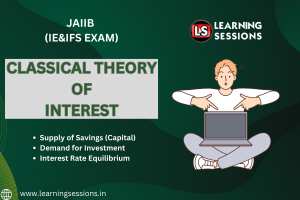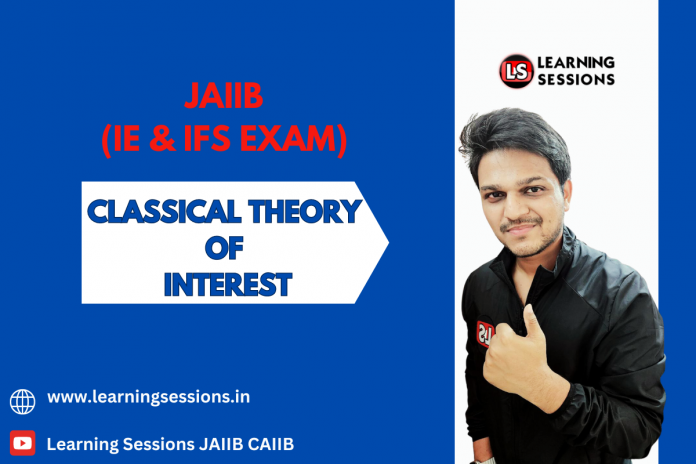For JAIIB (Junior Associate of the Indian Institute of Bankers) applicants, understanding the Classical Theory of Interest and its relevance to the Indian Economy (IE) and Indian Financial System (IFS) is dominant. The Classical Theory of Interest is one of the foundational concepts in economics that explains the determination of interest rates through the interaction of the forces of supply and demand for capital. Learning Sessions’ article, which will explore the Classical Theory of Interest and its application in India.

📚 JAIIB Study Resources 📚
👉 Check Here
👉 Check Here
👉 Check Here
👉 Get Tests Here
👉 Check Here
DOWNLOAD PDF CLASSICAL THEORY OF INTEREST-CASE STUDY
According to this theory, the interest rate is determined by the supply of savings (capital) and the demand for investment (capital). The key elements of the Classical Theory of Interest are:
-Supply of Savings (Capital)
-Demand for Investment
-Interest Rate Equilibrium
The Classical Theory of Interest provides a useful structure for understanding interest rate determination. It has limitations too, like the classical model assumes a static economy with no changes in technology or productivity. In reality, economies are dynamic, and interest rates are influenced by several other factors like inflation, government policies, and external trade dynamics. The classical theory does not clearly consider the role of the money supply. In today’s interconnected world, global factors such as international capital flows, exchange rates, and geopolitical risks also affect interest rates, something not accounted for by the Classical Theory. For the extensive preparation of candidates, get details through our YouTube videos for JAIIB IE & IFS Module wise Syllabus with explanations and tips to help candidates in their preparation journey.
You may also like these JAIIB Case Studies:
JAIIB | IE & IFS | HIRE PURCHASE
JAIIB | IE & IFS | CREDIT RATING
In general it can be said that for JAIIB candidates, this theory remains relevant in understanding the broader forces at play in the Indian financial system and how interest rates are shaped by the supply and demand for capital. The Classical Theory of Interest offers a foundational substructure for understanding how interest rates are determined by the interaction of savings and investment. Learning Sessions provides additional information about JAIIB IE & IFS PRICE DISCOVERY by giving examples of real life scenarios.
Learn more about this case study through our YouTube channel and PDF.
Get access to our Telegram Channel for free Pdfs of JAIIB.
You May also Find these JAIIB Posts Useful





